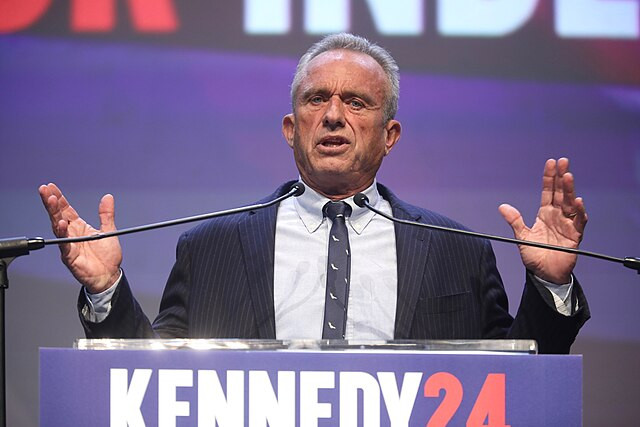Robert F. Kennedy Jr., a prominent independent presidential candidate, has been barred from appearing on New York's ballot in November after a state judge ruled on Monday that he falsely claimed residency in the state. The decision is a significant setback for Kennedy, who has faced multiple challenges to his candidacy across the country.
The ruling, delivered by Judge Christina Ryba, found that Kennedy's claim of a New York residence was not genuine. According to the judge, the room in a friend's home in Katonah, a suburb of New York City, which Kennedy listed as his residence, was a "sham" address used solely to maintain voter registration in the state. "Given the size and appearance of the spare bedroom as shown in the photographs admitted into evidence, the Court finds Kennedy's testimony that he may return to that bedroom to reside with his wife, family members, multiple pets, and all of his personal belongings to be highly improbable, if not preposterous," Ryba wrote in her 34-page ruling.
The challenge was brought by Clear Choice Action, a Democratic-aligned group that has been actively seeking to block Kennedy and other third-party candidates from ballot access in multiple states. The group celebrated the court's decision, emphasizing that Kennedy's use of a friend's address for political and voting purposes, while rarely being physically present, did not meet the legal requirements for residency under New York's Election Law. "To hold otherwise would establish a dangerous precedent and open the door to the fraud and political mischief that the Election Law residency rules were designed to prevent," Ryba noted.
Kennedy, who has been running as an independent after initially seeking the Democratic nomination, has lived in California since 2014, following three decades of residence in Westchester County, New York. Despite his relocation, Kennedy listed his friend's Katonah address as his primary residence on his presidential petition. During the trial, Kennedy admitted that he had only slept in the room once since moving in, citing his demanding travel schedule for the campaign. The homeowner, Barbara Moss, testified that Kennedy pays her $500 a month in rent, but the court found it suspicious that the first payment was made only after a New York Post article questioned his residency.
Kennedy's campaign quickly denounced the ruling, vowing to appeal the decision. In a statement, Kennedy accused the Democratic Party of attempting to undermine democracy by blocking his access to the ballot. "The Democrats are showing contempt for democracy," Kennedy stated. "They aren't confident they can win at the ballot box, so they are trying to stop voters from having a choice. We will appeal and we will win."
The implications of this ruling could extend beyond New York. Kennedy has used the Katonah address to file for candidacy in 17 other states, and similar challenges may arise in those jurisdictions. As of now, Kennedy's campaign claims to have secured ballot access in 46 states, although access has only been confirmed in 15 states, including key battlegrounds like Michigan, North Carolina, and Nevada.
In a parallel case on Monday, Kennedy successfully defended his ballot access in North Carolina, where a challenge by the state's Democratic Party was rejected. However, the outcome in New York raises questions about his ability to maintain ballot access in other states that may scrutinize his residency claims.
Kennedy's exclusion from the New York ballot is a blow to his campaign, particularly in a state where he has strong name recognition due to his family's legacy and his environmental advocacy work. Polling in New York had shown Kennedy with a modest but significant level of support, which has now been compromised by this legal battle.





